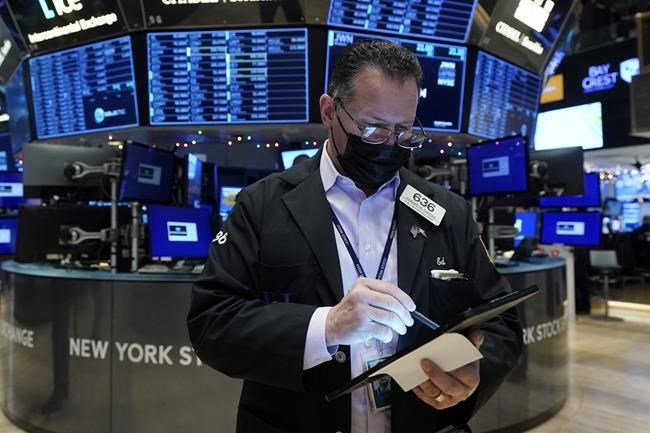TORONTO — Canada's main stock index snapped a two-day rally as the technology sector was weighed down by plunging Nuvei Corp. shares following a critical report by a short seller.
The S&P/TSX composite index closed down 85.30 points to 21,077.35 after posting its strongest back-to-back sessions in more than 10 months.
"What we probably saw with the two-day streak was maybe a bit of bargain-hunting or short-covering, but it just seems to me like that was a bit of a relief rally and that things hadn't actually changed very much in terms of news," said Colin Cieszynski, chief market strategist at SIA Wealth Management.
In New York, stock markets also rose. The Dow Jones industrial average was up 35.32 points at 35,754.75. The S&P 500 index was up 14.46 points at 4,701.21, while the Nasdaq composite was up 100.07 points at 15,786.99.
The tech sector was the biggest laggard on the day, losing 2.2 per cent as Nuvei shares dropped as much as 55.6 per cent. They closed down 40 per cent following a report from short-seller Spruce Point Capital Management that raised concerns about Nuvei chief executive Philip Fayer and the company's growth record and acquisition strategy.
Cieszynski said Canada's tech sector is so small that any sizable moves by one company can have an oversized impact on the sector's performance.
Seven of the 11 major sectors on the TSX were lower, with industrials down one per cent even though Air Canada shares gained 2.1 per cent in keeping with the upswing of the U.S. travel sector.
Energy was up half a per cent on slightly higher crude oil prices after weekly U.S. stockpiles fell less than expected at 240,000 barrels to 432.9 million barrels due to rising imports and another release from the U.S. strategic oil reserves.
The January crude oil contract was up 31 cents at US$72.36 per barrel and the January natural gas contract was up 10.7 cents at nearly US$3.82 per mmBTU.
Shares of Suncor Energy Inc. were down 1.2 per cent.
Materials was higher on increased metals prices.
The February gold contract was up 80 cents US at US$1,785.50 an ounce and the March copper contract was up 5.4 cents at US$4.39 a pound.
The Canadian dollar was relatively flat after the Bank of Canada failed to surprise. It said Wednesday it is keeping its trendsetting rate at the rock-bottom level of 0.25 per cent until some time between April and September next year, which is unchanged from its previous guidance.
The loonie traded for 79.10 cents US compared with 78.99 cents US on Tuesday.
"Maybe they might have highlighted the disruptions from the B.C. landslides, but even then the markets have known about that for a few weeks," Cieszynski said.
"I don't think there's anything really in particular that's driving the markets today. It's just a case where we've had this fairly solid selloff over 10 days and then we've had a bit of a relief rally here, but there wasn't anything really changed to make anybody more positive."
This report by The Canadian Press was first published Dec. 8, 2021.
Companies in this story: (TSX:SU, TSX:NVEI, TSX:AC, TSX:GSPTSE, TSX:CADUSD=X)
Ross Marowits, The Canadian Press


